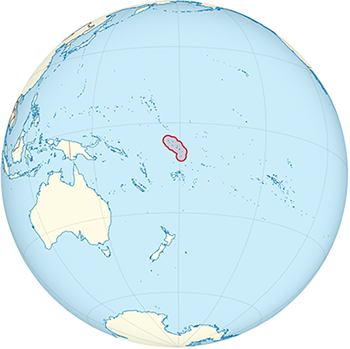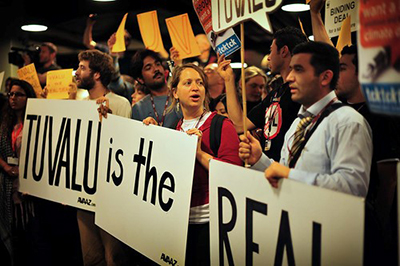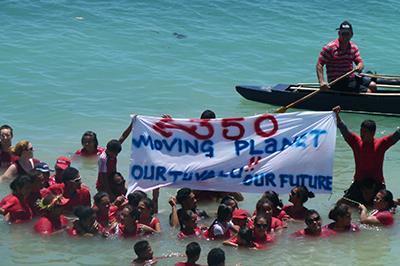Tuvalu, a country consisting of several small islands, has been described as a canary in a mine, as it is predicted to become the first country to disappear into the ocean (Mason, n.d.).
 Location of Tuvalu
Why is the sea level rising?
Location of Tuvalu
Why is the sea level rising?
Global sea-level rise is caused by the melting of ice sheets in Greenland and Antarctica and the expansion of seawater as it heats up (Humphreys, 2019a). Over the period 1901-2010 global average sea levels rose 0.19 metres (IPCC, 2013). Predictions for future sea-level rise vary. The impact on varying levels of sea-level rise in different locations can be explored by looking at this map.
Tuvalu's vulnerability to sea-level rise
As the fourth smallest country in the world, Tuvalu is a nation made up of several widely dispersed low-lying islands which are located between Australia and Hawaii in the Pacific Ocean. It is described as ‘perhaps the most threatened atoll nation due to impacts of climate change’ by Tuvalu’s former prime minister Enele Sopoaga (The Guardian, Oct 2019). Indeed, over 30 years ago (in 1989) a United Nations report stated that Tuvalu would vanish in the twenty-first century unless global warming was drastically reduced (Mason, n.d.).
What are the effects of climate change on Tuvalu?
Even without climate change the islands of Tuvalu would been vulnerable to the sea. However, with climate change extreme weather events, coastal erosion and sea water inundation are increasing (UNDP, 2020).
 Demonstrators in Tuvalu
The islands are experiencing more extensive tropical storms in the wet season (October to March), causing damage to infrastructure, farming and livelihoods. Whilst in the dry season (June to September) increasing droughts in are putting the source of fresh water, rainfall, at risk. In addition, groundwater has become contaminated by salt (UNDP, 2020). This leads to saline pollution affecting crops and fruit trees. Added to this is the additional problem of sea temperature rise, leading to coral bleaching and impacts on marine life. This is causing depletion of fish stocks, particularly tuna, on which the island economy depends (UNDP, 2020).
Demonstrators in Tuvalu
The islands are experiencing more extensive tropical storms in the wet season (October to March), causing damage to infrastructure, farming and livelihoods. Whilst in the dry season (June to September) increasing droughts in are putting the source of fresh water, rainfall, at risk. In addition, groundwater has become contaminated by salt (UNDP, 2020). This leads to saline pollution affecting crops and fruit trees. Added to this is the additional problem of sea temperature rise, leading to coral bleaching and impacts on marine life. This is causing depletion of fish stocks, particularly tuna, on which the island economy depends (UNDP, 2020).
Tuvalu's fight for existence - Environmental justice
As a small economically poor country Tuvalu has limited power to put forward its case for action in international negotiations on climate change. Nevertheless, as part of a group of countries, the ASIS (Alliance for Small Island States), and with support from climate change campaign groups such as 350.org (350.org, 2020), it has worked hard to highlight the need for action on climate change.
 An awareness event about climate change
An awareness event about climate change
The ASIS (Alliance for Small Island States) has been arguing that there should be urgent international action to mitigate climate change. Mitigation of climate change could be achieved by the reduction of greenhouse gas emissions or the enhancement of carbon sinks, where carbon dioxide is removed from the atmosphere, such as by increasing tree cover. The ASIS argues that damaging greenhouse emissions have been caused primarily by the burning of fossil fuels, mainly by rich industrialised countries. They argue that as small island states have not been responsible for the damaging greenhouse gas emissions, but are suffering the consequences, it is the industrialised countries who caused the problem that should take responsibility. To do this the industrialised countries should cover more of the cost of adaption measures to help deal with the effects of climate change. The issue of who should take responsibility is one of ethics and moral fairness. It is a matter of ‘environmental justice’ (Humphreys 2019).
The future for Tuvalu?
Disagreements continue internationally with some big polluters, such as the US, being reluctant to take action to curb their emissions. Even if urgent action for mitigation began now, the sea level will continue to rise for some time. In the meantime, Tuvalu has its own Coastal Adaption Plan. This includes mitigation such as a programme of tree planting and adaption: community water tank projects, seawall construction (UNDP, 2020) and new housing built on stilts (Mason, n.d.). However, given the uncertain future some Tuvalu residents have relocated to other countries and others are planning similar moves. People with children are especially concerned that there will be no future on the islands. "I'm worried about the islands," said one woman with tears in her eyes. "This is the best island I know, and I think it's going to end up under the sea. We're thinking of migrating to New Zealand. I don't want my children to see this, it's enough." (Mason, n.d.).
EXPLORE FURTHER: To see how Bangladesh is coping with the effects of sea-level rises, click here. Too see how your local area might be affected, follow this link to the map produced by Climate Central, based on the recent paper by Kulp and Strauss (2019).





Rate and Review
Rate this article
Review this article
Log into OpenLearn to leave reviews and join in the conversation.
Article reviews